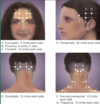Headache & Facial Pain Flashcards
Calcitonin gene-related peptide (CGRP) antagonist: pathways
- These receptors occur at all Sites involved in migraine pathogenesis as well as vasodilation
- Locations: DRG, CN V & X gnaglia, dorsal horn, trigeminal nucleus caudallis, nucleus of the solitary tract, brainstem, amygdala, hypothalamus, hypothalamic nuclei, dorsal insular cortex

GCRP’s actions (6)
(calcitonin gene-related peptides)
- Vasodilation
- Mast cell degranulation
- Dural inflammation
- Peripheral sensitization
- Pain transmission
- Central sensitization
______ is released into the jugular venous system during migraine which in turn evokes the migraine.
CGRP’s (calcitonin gene-related peptides)
Antibodies to CGRP or its receptor prevents migraine by _______ (2)
- Removing excess CGRPs released from the trigeminal nerve endings
- Receptor antibodies blocks the receptor from signaling transmission
Anti-CGRP monoclonal Antibodies have ______% responder rate.
75
(rapid onset, good tolerance & safety, no neutralizing antibodies detected)
Go-to medication for migraine?
Anti-CGRP monoclonal antibodies
Short term side effects of anti-CGRP monoclonal antibodies (4)
- URI
- nausea
- hyper-sensitivity rxn
- constipation
Potential long-term side effects from anti-CGRP monoclonal antibodies (4)
- pituitary dysfxn
- cardiovascular (ischemia, HTN)
- GI (ulcer, IBS)
- Skin (infalammation, wound healing)
Botox MOA
- Produces sensory input to CNS
- Reduces input to muscle spindle
- Decreases Nocioceptor Pathways
- C and A delta fibers
- Substance P
- CGRP
- Glutamate release
- Mechano- and Chemo-receptors

Botox has been approved for chronic migraine by the FDA if _____ (2).
- Greater than 15 headaches per month (have them keep a headache calendar)
- Failed two classes of prophylactic medications

Botox includes _____ injections each treatment, over _____weeks.
- 30 to 40
- 12
(Cost 300 to $600 for treatment)

Which drugs have level A (evidence-base medicine grade - more than 1 class 1 trial) (5)?
- Anti-CGRP mAb (MC used)
- Antiepileptic
- Beta blockers
- Botulinum toxin A
- Triptans

Define status migrainosus (2)
- Migraine that lasts over 72 hours
- Refractory to Conventional treatment
Status migrainosus treatment (4)
- Steroid burst (dexamethasone or prednisone)
- Headache cocktail (3 different cocktails)
- IV valproate
- DHE-DiHydroErgotamine (last resort: must be admitted, Neurologist handles this)
(DO NOT give opioids)
Headache cocktails for status migrainosis (3)
- Ketorolac, Diphenhydramine, Prochlorperazine
- Metoclopramide, Benadryl, Ibuprofen
- DHE Nasal spray, prochlorperazine (DHE- must admit & call neurologist)
Emergency room treatment for status migrainosus (5)
- IV normal saline (if they’ve been vomiting/diahrrea)
- Diphenhydramine
- Metoclopramide
- Magnesium Sulfate
- Ketoralac
(all via IV. If no response: Valproate, Levetiracetam, Methylprednisolone, Dihydroergotamine)




